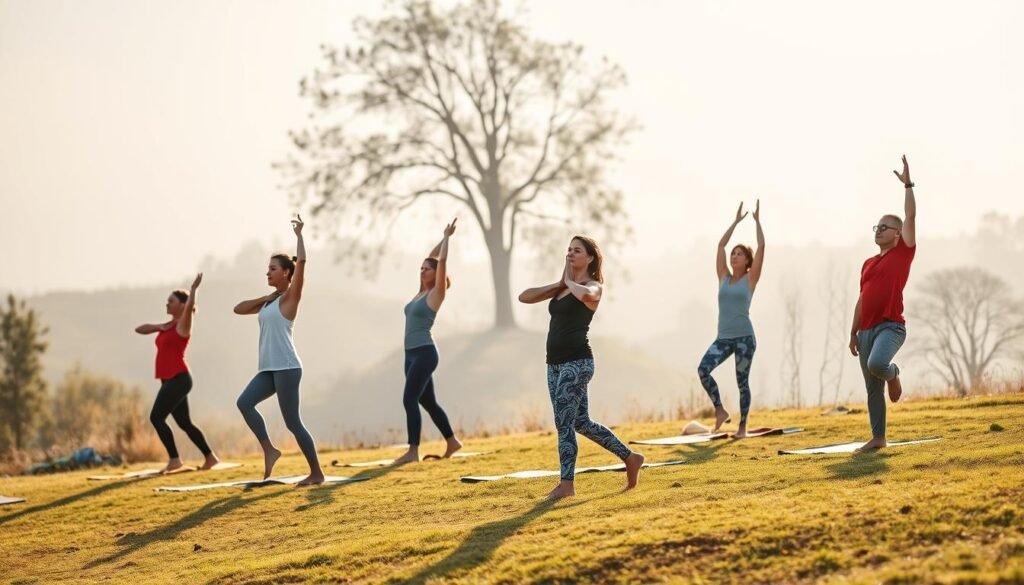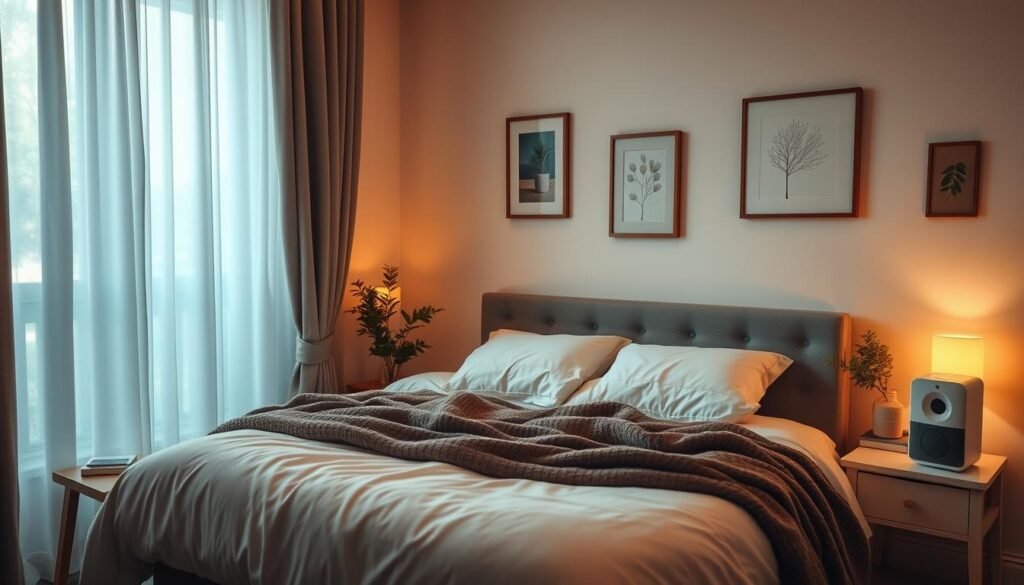Did you know nearly 44% of adults have trouble sleeping because of stress? This happens at least once a month. It’s very important to improve sleep quality for anxiety sufferers. Not sleeping enough can make anxiety worse and hurt mental health. Good sleep makes you feel happier and is vital for thinking clearly. This is especially true for those dealing with anxiety.
This article talks about different sleep strategies for those with anxiety. We’ll cover everything from sleep hygiene to relaxation techniques. You’ll find tips for better sleep. By having a steady routine and using mindfulness, you can fight off sleep disruptions caused by stress. For more in-depth tips for rest, check out this useful resource. It goes into detail on anxiety’s role in sleep quality.
Key Takeaways
- Sleep issues are common, especially in people with anxiety.
- Relaxation methods can greatly improve how well you sleep.
- Keeping the same sleep schedule is key for better mental health.
- Yoga and meditation help lessen sleep problems from stress.
- Not getting enough sleep can lead to health issues, showing the importance of quality rest.
The Connection Between Sleep and Anxiety
The link between sleep and anxiety is both complex and cyclical. People with anxiety often have trouble sleeping. This includes problems like not being able to fall asleep and feeling very tired during the day. Studies show that 24% to 36% of people with anxiety struggle with insomnia. Meanwhile, 27% to 42% experience too much sleep.
Sleep has two main phases: non-rapid eye movement (NREM) and rapid eye movement (REM). Healthy sleep cycles through these stages, usually lasting 90 minutes. But, sleep problems can mess up this cycle. This makes anxiety worse and restful sleep harder to get.
Sleep patterns are controlled by our circadian rhythm and sleep drive. The circadian rhythm helps decide when we sleep, and our sleep drive shows how much sleep we need. Issues in neurotransmitter systems also play a big role in these problems. This shows how closely sleep and anxiety disorders are linked.
Bad sleep leads to issues like feeling easily annoyed and having tense muscles. This can make it hard to sleep well. In the long run, not sleeping enough can cause serious health problems. These include obesity, diabetes, and heart disease. So, improving sleep quality is important. It can really help reduce anxiety.
Understanding how sleep and anxiety affect each other is important. It shows that better sleep could be key in treating anxiety effectively.
Understanding Sleep Disturbances
Sleep problems can show up in many ways, hurting our well-being. Things like insomnia and hypersomnia lessen sleep quality, increasing sleep issues risk. Insomnia makes falling or staying asleep hard, often mixing with anxiety. This causes stress that worsens sleep problems.
When life gets busy and stress builds up, it hurts our sleep more. This leads to inconsistent sleep patterns and not getting enough sleep.
It’s key to see how sleep issues impact us. Those with sleep problems might see their mental health get worse. This makes anxiety and depression more complicated. Studies show that understanding sleep issues has led to better treatments. Cognitive-behavioral therapy (CBT) has been really effective for insomnia.
Sleep therapy aims to improve sleep habits and use behavioral techniques. Techniques like sleep restriction therapy and mindfulness can help a lot. They also teach ways to relax, like muscle relaxation, which helps with anxiety and sleep.
Making sure we sleep well is super important. It helps improve our sleep quality and deals with anxiety.
Looking more into how sleep and mental health are linked is helpful. Therapy and changing our lifestyle can lead to improvements. It shows how critical it is to treat sleep issues and their effects.
For those dealing with anxiety and insomnia, knowing about these sleep problems is crucial for getting better. You can find more info in the detailed guide on the relationship between anxiety and insomnia.
Importance of Sleep Hygiene
Getting good sleep is key to overall health. Healthy sleep practices improve your sleep and reduce stress. They make your sleep routine better and ease anxiety.
Develop a Consistent Sleep Schedule
Sticking to a regular sleep schedule is important. It helps you sleep better. Try to sleep and wake up at the same time every day, even on weekends. Not doing so can lead to more sleep problems.
Studies show inconsistent sleep schedules can make it hard to sleep. This impacts mental health and how alert you feel during the day.
Create a Restful Bedroom Environment
Making your bedroom peaceful is key to sleeping well. You should reduce noise and light and have comfortable bedding. Aim for a cool, dark, and quiet room to help your body relax and sleep deeply.
Using blackout curtains and earplugs can make a big difference in sleep quality.
Relaxation Techniques to Reduce Anxiety
Implementing effective relaxation techniques can greatly lower anxiety levels and aid in achieving a calm mind. Activities like deep breathing exercises and yoga are very helpful for relaxation and emotional control. Doing these regularly can improve your overall well-being and sleep quality.
Deep Breathing Exercises
Deep breathing is a key part of relaxation techniques to ease the nervous system. Just a few minutes of deep breathing can quickly reduce anxiety. Taking slow, deep breaths helps slow down your heartbeat and relax, making stress easier to handle. Diaphragmatic breathing, in particular, improves breathing and helps with relaxation.
Yoga and Stretching for Relaxation
Yoga is popular for reducing anxiety because it helps with emotional balance and sleep. It includes gentle stretches and movements that relax the muscles and calm the mind. Yoga nidra, for example, is a practice that helps prepare the body for a deep sleep. Doing yoga or stretching often can also boost your focus and mood, helping you tackle daily challenges better.
Mixing relaxation methods with positive ways to cope, like effective time management and healthy living, can bring bigger benefits. It’s important to know how anxiety affects sleep. If you have anxiety, be patient with yourself and keep up with relaxation exercises to enhance well-being and lessen stress.
| Relaxation Technique | Benefits |
|---|---|
| Deep Breathing | Slows heart rate, induces calm, reduces stress |
| Yoga | Enhances emotional regulation, improves sleep quality |
| Stretching | Relieves muscle tension, fosters relaxation |
| Visualization | Promotes a tranquil mindset, reduces anxiety |
| Progressive Muscle Relaxation | Alleviates tension, induces relaxation |
For more tips on managing anxiety well, check out this resource.
Improving Sleep Quality for Anxiety Suffers
People with anxiety can feel a lot better by sleeping well. A careful plan helps set routines that make relaxation easier. These routines not only calm the mind but also ease the shift into sleep.
Establishing a Pre-Sleep Routine
Having a pre-sleep routine tells our bodies it’s time to relax. Doing calming activities helps create a peaceful mood for sleep. Try adding these to your evening:
- Reading a book
- Meditation or mindfulness exercises
- Taking a warm bath to relax muscles
- Listening to soft music or nature sounds
These habits help remove stress from the day, making it easier to sleep.
Limiting Screen Time Before Bed
Cutting down on screens before bed is key for better sleep. Screens’ blue light can mess with sleep hormones. Here are some tips to help:
- Avoid screens at least an hour before bedtime
- Use blue light filters on devices if needed
- Choose activities that don’t involve screens, like writing or stretching
These changes can help anyone, especially those with anxiety, sleep better.
Cognitive Behavioral Therapy for Insomnia (CBT-I)
Cognitive Behavioral Therapy for Insomnia, or CBT-I, helps manage insomnia tied to anxiety. It involves 6-8 sessions designed for each person. These sessions work on changing negative thoughts that stop good sleep. By tackling what causes insomnia, CBT-I can make sleep much better.
How CBT-I Can Help
CBT-I uses techniques like improving sleep patterns and changing unhelpful thoughts. This therapy helps 70% to 80% of people with insomnia sleep better. A study in 2015 showed it reduces the time it takes to fall asleep by 19 minutes and adds 8 minutes of sleep time. The American College of Physicians recommends it for dealing with both new and long-term insomnia.
Benefits of Professional Support
Getting help from a professional can offer more insight and support than trying alone. The U.S. has few experts in behavior sleep therapy, but finding one can make a big difference. They provide individual guidance, making CBT-I more effective. For more info, visit cognitive behavioral therapy for insomnia.

Natural Solutions and Sleep Aids
For those looking to better their sleep, natural aids can help. Things like herbal remedies and essential oils are options. They help you relax and get a good night’s sleep.
Herbal Teas and Supplements
Herbal solutions are key for better sleep. Chamomile tea is known for its calming effect. It’s great right before bed. Valerian root is another good choice, shown to improve sleep well.
A study found that taking 530 mg of valerian root nightly for a month helped people sleep better. Melatonin, magnesium, and vitamin B can also help with insomnia.
Using Essential Oils for Sleep
Essential oils are popular for sleep improvement. Lavender oil, for example, has helped many.
Putting a bit of lavender oil in a diffuser before bed can make a peaceful environment. Passionflower and ylang-ylang oil are also good for a restful night.
| Natural Sleep Aid | Type | Effectiveness |
|---|---|---|
| Chamomile Tea | Herbal Remedy | Soothes and calms |
| Valerian Root | Herbal Supplement | Improves sleep latency and duration |
| Lavender Oil | Essential Oil | Enhances sleep quality |
| Melatonin | Supplement | Regulates sleep-wake cycles |
| Passionflower | Herbal Supplement | Improves sleep quality |
Exercise for Better Sleep
Doing regular physical activity each day can make sleep quality better. When we exercise, our sleep improves because our body can rebuild itself better during rest. Exercise is key for those looking to get better rest naturally and lower stress.
The Role of Physical Activity
Moderate aerobic exercise helps increase deep sleep, which refreshes our mind and body. Just 30 minutes of such exercise can enhance sleep quality that very night. Adults who exercise for 30 minutes daily often sleep about 15 minutes longer than those who don’t.
Regular moderate exercise brings positive sleep changes without needing intense or long workouts. It shows the power of staying active.
Timing Your Workouts
When you exercise is important to sleep better. It’s best to exercise 1 to 2 hours before going to bed. This helps calm the brain, lowering endorphin levels for better sleep.
While exercising near bedtime might affect some people’s sleep, others do fine. It’s important to find the exercise time that works best for you.

| Exercise Type | Benefits for Sleep |
|---|---|
| Moderate Aerobic Exercise | Increases slow wave sleep, leads to improved mood, and promotes relaxation. |
| Power Lifting | Engages biological processes that support better quality sleep. |
| Active Yoga | Reduces stress, aids in falling asleep, and improves overall sleep quality. |
| Consistency in Exercise | Regular moderate exercise shown to positively impact sleep quality. |
Medication Options for Anxiety and Sleep
For people with anxiety and sleep problems, medication can be key. It offers options to manage symptoms and improve life quality. Knowing about these meds helps people make smart decisions with their doctors.
Understanding Anti-Anxiety Medications
Benzodiazepines and antidepressants are common anti-anxiety meds. Lorazepam and diazepam are benzodiazepines used for quick relief. They’re good for short-term use because they can lead to dependence.
Antidepressants can be used for longer periods. They help with anxiety and depression. Doctors check how well these meds work after about six weeks, looking for side effects and effectiveness.
Consulting Your Healthcare Provider
Talking to a doctor is vital for treating anxiety and sleep issues. They often suggest lifestyle changes and therapy first. If meds are needed, a plan is made based on personal needs and history.
Medications might include sleep aids like eszopiclone, ramelteon, or trazodone. These help you sleep better without being addictive. A doctor’s consultation helps find the best and safest treatment.
Sleep Environment Optimization
Making your sleep space perfect can really make your sleep better. It helps to focus on two main things: keeping light and noise down and making sure your bed is cozy. These steps are key to making your sleep space better, helping you get a good night’s rest.
Adjusting Light Levels and Noise
It’s important to keep your sleeping area dark and quiet. A dark room helps your body get ready to sleep by producing melatonin. Putting up blackout curtains is a smart way to block out too much light. Also, choosing curtains or blinds that keep out light helps you sleep without interruption.
Keeping noise down is just as crucial. You might want to try soundproofing or a white noise machine to hide outside noises. Even simple solutions like earplugs can make a big difference. All these steps together turn your bedroom into a peaceful place for sleep.
Using Comfortable Bedding
The right bedding is key to sleeping well. Picking a mattress and pillows that suit your needs can change how well you sleep. Choose materials that keep you cool and dry for extra comfort. Spending a bit more on quality sheets and blankets makes your bed more inviting, helping you sleep deeply.
To sum it up, making your sleeping area better by controlling light and noise, and choosing comfy bedding, can make your sleep much better and reduce stress. It’s important to take care of these things to sleep well and stay healthy.

Sleep Tracking Apps and Technology
In today’s world, sleep quality is a big challenge for many. Technology now lets us monitor and improve our sleep habits. Sleep tracking apps are key. They give insights into our sleep and help identify how to get better.
Monitoring Sleep Patterns
Understanding our sleep starts with seeing our habits. Studies show that 66% of sleep apps focus on tracking. Users can monitor how long and well they sleep, along with any disruptions. This gives a clear look at their rest. These apps often come with extra tools like alarms and sleep diaries.
Using Technology to Improve Sleep Quality
Technology for better sleep isn’t just on phones. Wearables work with apps to track sleep more accurately. For example, apps like CBT-I Coach use cognitive behavioral therapy for insomnia. This includes sleep education and relaxation tips. Using these tech aids, users can make their rooms better for sleep. Smart lights and sounds can make the environment more peaceful.
| Feature | Percentage of Apps |
|---|---|
| Monitoring Sleep | 66% |
| Record Sleep Diary | Variable |
| Provide Alarms | Variable |
| Relaxation Exercises | Available in Many Apps |
| Cognitive Behavioral Therapy | Specific Apps Available |
As tech grows, sleep apps will get even better. Using these tools can really help improve our sleep quality.
Conclusion
Knowing how sleep and anxiety are linked is key for those facing mental health issues. Bad sleep can make anxiety worse. On the other hand, handling anxiety well can help you sleep better. People can get better sleep by trying different relaxation methods and creating a good sleep space.
Studies show a tight connection between anxiety disorders and sleep problems, such as insomnia. In fact, 24-36% of people with insomnia also have anxiety disorders. This shows how important it is to look at mental health to sleep better. Some strategies, like using herbal remedies and changing your diet, can help too.
There are many ways for those with anxiety to improve their sleep. This can make their nights restful and their lives better. By applying these tips, they can lessen their anxiety and find calmness.